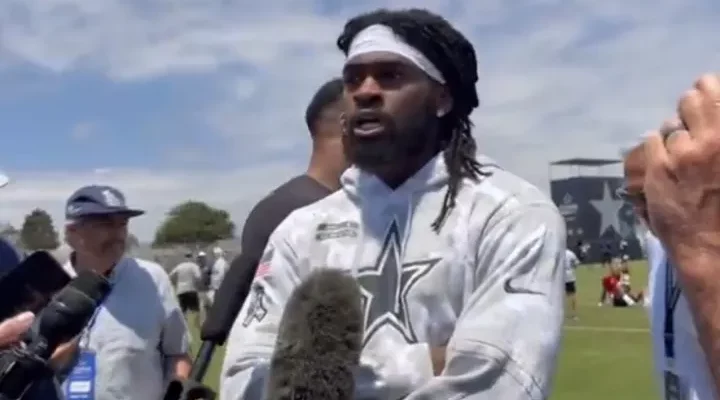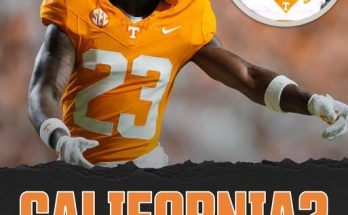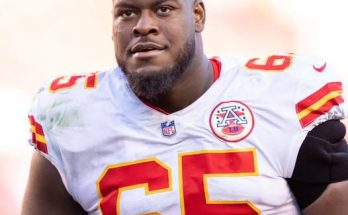When a star cornerback like Trevon Diggs speaks, the NFL world listens—especially when he’s being brutally honest about his own financial pain. In an era where athletes are often seen as untouchable and insulated by massive contracts, Diggs broke through the glamour and revealed the human side of money management in the NFL. During a recent appearance, the Dallas Cowboys star didn’t shy away from admitting that a financial misstep—losing \$500,000 of his salary—left him emotionally wounded. In his words, it “hurt my feelings.” That single sentence, raw and unfiltered, reminded fans and players alike that behind the big plays and bigger paychecks are real people who feel the sting of financial mistakes just like everyone else.
Trevon Diggs is known for his lockdown coverage, game-changing interceptions, and aggressive mentality on the field. But off the field, the All-Pro cornerback showed an unusual amount of vulnerability. The \$500,000 loss he mentioned reportedly stemmed from a decision involving his salary during an offseason absence. The details remain private, but what’s clear is that it wasn’t the kind of situation any player wants to be in. Whether it was fines, clauses triggered by non-attendance, or a strategic miscalculation, the result left a half-million-dollar dent in his wallet and a deeper bruise on his pride.
For Diggs to acknowledge how deeply it affected him, especially publicly, is telling. NFL players are trained to be stoic. They’re coached from a young age to be mentally tough, to ignore the noise, and to never show weakness—especially not in front of cameras and microphones. Yet here was a Cowboys star pulling back the curtain and admitting the hit wasn’t just financial, it was emotional. “It hurt my feelings,” he said, a phrase that instantly made headlines and resonated with fans across all walks of life.
Why did it hurt so much? It’s not just the monetary value—though \$500,000 is a lot for anyone, even a millionaire. It’s the principle. Diggs, like many players, works tirelessly year-round to perform at the highest level. Every practice rep, film session, and workout contributes to the dollars in his bank account. Losing that money—especially if it came from something avoidable—can feel like watching your hard work evaporate. It’s more than just numbers on a paycheck; it’s sweat equity, sacrifice, and time spent away from family. For someone like Diggs, it’s a blow that goes deeper than financials.
This also brings attention to how NFL contracts are structured. Unlike the NBA or MLB, NFL contracts are often filled with clauses, incentives, and pitfalls that can drastically affect a player’s earnings. Teams protect themselves with non-guaranteed money and language that allows for withheld pay under certain conditions. This makes financial literacy essential for players—but it’s not always a priority in the early stages of their careers. Many young athletes, freshly minted into wealth, are still learning how to navigate the complicated waters of contract law, taxes, agents, and union rules. Mistakes happen, and sometimes those mistakes cost six figures.
Diggs’ admission is also a timely reminder of the pressures NFL stars face to perform, not just athletically but financially. They are often expected to be savvy investors, philanthropic community figures, and role models, all while dealing with the brutal realities of an unforgiving sport. The NFL has a short shelf life. The average career lasts just over three years, and for every megastar earning \$30 million a year, there are hundreds of players grinding out league minimum contracts, trying to maximize every dollar they earn before the game leaves them behind.
Trevon Diggs is not just any player. Since being drafted by the Cowboys in 2020, he’s become a cornerstone of the franchise’s defense. His 2021 season was one of the most explosive in recent memory, with 11 interceptions and two touchdowns. He signed a lucrative five-year, \$97 million extension in 2023 that cemented his status among the NFL’s elite. But despite his wealth and rising fame, Diggs’ candid comment showed that no amount of money makes you immune to the sting of a financial loss—especially when you feel like you could’ve prevented it.
That honesty struck a chord with fans. In a sports world filled with polished statements and media-trained quotes, Diggs’ blunt confession was refreshingly human. Social media buzzed with reactions ranging from sympathy to respect. Fans appreciated the vulnerability, with many commenting that it made them feel more connected to a player who often seems larger than life on Sundays. Others saw it as a teachable moment—a reminder of the importance of knowing your contract, asking questions, and surrounding yourself with advisors who truly have your best interests in mind.
This moment may also resonate within locker rooms across the league. Younger players look up to veterans like Diggs, not just for how they play, but for how they manage life off the field. His willingness to speak openly about the emotional impact of a financial error could inspire others to pay closer attention to their own situations. In an NFL culture that often frowns on vulnerability, Diggs’ honesty could be a turning point in how players discuss money, mistakes, and the mental health aspect of dealing with financial stress.
Of course, the Cowboys organization itself is likely taking note. Dallas is no stranger to big contracts and even bigger headlines. With players like Micah Parsons and CeeDee Lamb due for massive paydays, the front office is juggling salary cap gymnastics and player happiness at the same time. Diggs’ comment adds a new layer to that equation: the emotional toll of financial penalties or contract disputes. It’s not just about numbers on a spreadsheet—it’s about trust, morale, and how players feel they’re being treated by the franchise.
The NFL has taken steps to improve financial education for its players, especially through rookie symposiums and team programs. But clearly, there’s still more work to be done. Players are human beings, not robots or walking investments. They make mistakes, they feel regret, and sometimes they just need to vent. Trevon Diggs gave fans a glimpse of that reality, and it’s a reminder that behind the helmet is a person who, just like everyone else, feels the burn when money disappears without warning.
In the grand scheme, Diggs will be just fine. He has a long career ahead of him, and his talent ensures he’ll continue to be one of the NFL’s top earners at his position. But the moment will stick with him—and with fans—because it humanized him in a way few interviews ever do. He didn’t lash out, he didn’t blame others, and he didn’t deflect. He just said it plainly: “It hurt my feelings.” That sentence turned a routine contract blip into a viral moment of relatability.
And that’s the part that can’t be quantified. It’s easy to count dollars and cents. It’s harder to measure the emotional cost of feeling like you fumbled the bag—especially when you pride yourself on being sharp, aware, and locked in at all times. In the cutthroat world of professional football, admitting that kind of hurt takes courage. Trevon Diggs showed that kind of courage, and in doing so, he became more than just a Pro Bowl cornerback. He became a mirror for thousands of fans who’ve also experienced the sting of financial regret and found a strange comfort in knowing that even the best of us feel the same pain sometimes.
So what’s next for Diggs? On the field, he’s expected to bounce back from injury and once again take his place as one of the most feared defensive backs in the league. Off the field, he’s likely to approach his contract and financial management with even sharper attention to detail. And as a leader in the Cowboys’ locker room, he may just become a voice of wisdom for those who are still learning the ropes. One painful moment could turn into a lifelong lesson—and potentially a legacy of financial mindfulness among his teammates.
In the end, Diggs’ \$500K loss may be just a footnote in a long and successful career. But the vulnerability he showed in speaking about it? That’s priceless.



